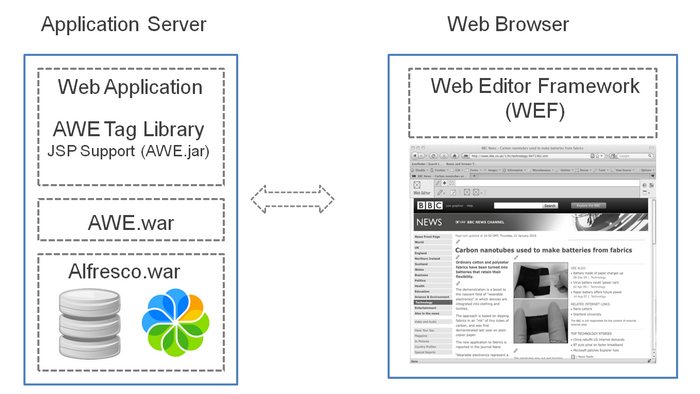The following diagram shows an example Web Editor deployment in the same application server as the repository.

The Web Editor is a Surf-based application, therefore it is also possible to deploy it in a different application server instance from the repository.
By default the AWE assumes your repository is at http://localhost:8080/alfresco/s/. If your repository is not located here, you can use custom configuration to tell the AWE where to find your repository. To change the default repository location, add the following XML in the AWE configuration file with your values for MYSERVER and MYPORT:
<alfresco-config>
<plug-ins>
<element-readers>
<element-reader element-name="remote" class="org.springframework.extensions.config.RemoteConfigElementReader" />
</element-readers>
</plug-ins>
<config evaluator="string-compare" condition="Remote">
<remote>
<endpoint>
<id>alfresco</id>
<name>SkyVault - user access</name>
<description>Access to SkyVault Repository WebScripts that require user authentication</description>
<connector-id>alfresco</connector-id>
<endpoint-url>http://MYSERVER:MYPORT/alfresco/s
</endpoint-url>
<identity>user</identity>
</endpoint>
</remote>
</config>
</alfresco-config>
The AWE configuration file is placed on the classpath named shared/classes/alfresco/web-extension/awe-config-custom.xml.
The deployment comprises the following components:
- AWE.war
- The Web Editor WAR file.
- Web Application
- Your own web application.
- AWE tag library
- Provides the ability to mark areas of the page as editable. The areas marked can represent any property or content from the repository.
- Web Editor Framework (WEF)
- The client-side JavaScript framework on which the Web Editor is built. It is built using
YUI and can be extended easily. New tabs and buttons can be packaged and dropped into the
framework. This provides the core product features, and also provides the ability to build
additional custom plugins.
When the Web Editor is enabled, the WEF renders the tool bar and basic in-context editing buttons and functionality. If the WEF is deployed as standalone, the default blank tool bar is rendered.
